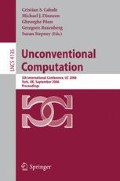Abstract
This paper is an investigation of S. Wolfram’s Principle of Computational Equivalence’ – that (discrete) systems in the natural world should be thought of as performing computations. We take a logical approach, and demonstrate that under almost trivial (physically reasonable) assumptions, discrete evolving physical systems give a class of logical models. Moreover, these models are of intuitionistic, or constructive logics – that is, exactly those logics with a natural computational interpretation under the Curry-Howard ‘proofs as programs’ isomorphism.
Access this chapter
Tax calculation will be finalised at checkout
Purchases are for personal use only
Preview
Unable to display preview. Download preview PDF.
References
Abramsky, S., Jung, A.: Domain Theory. In: Abramsky, S., Gabbay, D.M., Maibaum, T.S.E. (eds.) Handbook of Logic in Computer Science, vol. III, Oxford University Press, Oxford (1994)
Borceux, F.: Handbook of Categorical Algebra 3. In: Encyclopedia of Mathematics and its Applications, vol. 53. Cambridge University Press, Cambridge (1994)
Bunimovich, L.: Many Dimensional Lorentz Cellular Automata and Turing Machines. Int. Jour. of Bifurcation and Chaos 6, 1127–1135 (1996)
Dummett, M.: Elements of Intuitionism. Oxford University Press, Oxford (2000)
Girard, J.-Y.: Geometry of Interaction 1. In: Proceedings Logic Colloquium 1988, pp. 221–260. North-Holland, Amsterdam (1989)
Johnstone, P.: The point of pointless topology. Bulletin American Mathematical Society 8(1), 41–53 (1983)
Robinson, J.: A machine-oriented logic based on the resolution principle. Communications of the ACM 5, 23–41 (1965)
Scott, D.: Outline of a mathematical theory of computation. In: 4th Annual Princeton Conference on Information Sciences and Systems, pp. 169–176 (1970)
Silagadze, Z.: Zeno meets modern Science. Acta Phys. Polon. B36, 2886–2930 (2005)
Urzyczyn, P., Sorensen, M.: Lectures on the Curry-Howard Isomorphism. Elsevier, Amsterdam (2006)
Wolfram, S.: A New Kind of Science. Wolfram Media (2002)
Vickers, S.: Topology via Logic. Cambridge Tracts in Theoretical Computer Science, p. 5 (1998)
Author information
Authors and Affiliations
Editor information
Editors and Affiliations
Rights and permissions
Copyright information
© 2006 Springer-Verlag Berlin Heidelberg
About this paper
Cite this paper
Hines, P. (2006). Physical Systems as Constructive Logics. In: Calude, C.S., Dinneen, M.J., Păun, G., Rozenberg, G., Stepney, S. (eds) Unconventional Computation. UC 2006. Lecture Notes in Computer Science, vol 4135. Springer, Berlin, Heidelberg. https://doi.org/10.1007/11839132_9
Download citation
DOI: https://doi.org/10.1007/11839132_9
Publisher Name: Springer, Berlin, Heidelberg
Print ISBN: 978-3-540-38593-6
Online ISBN: 978-3-540-38594-3
eBook Packages: Computer ScienceComputer Science (R0)

